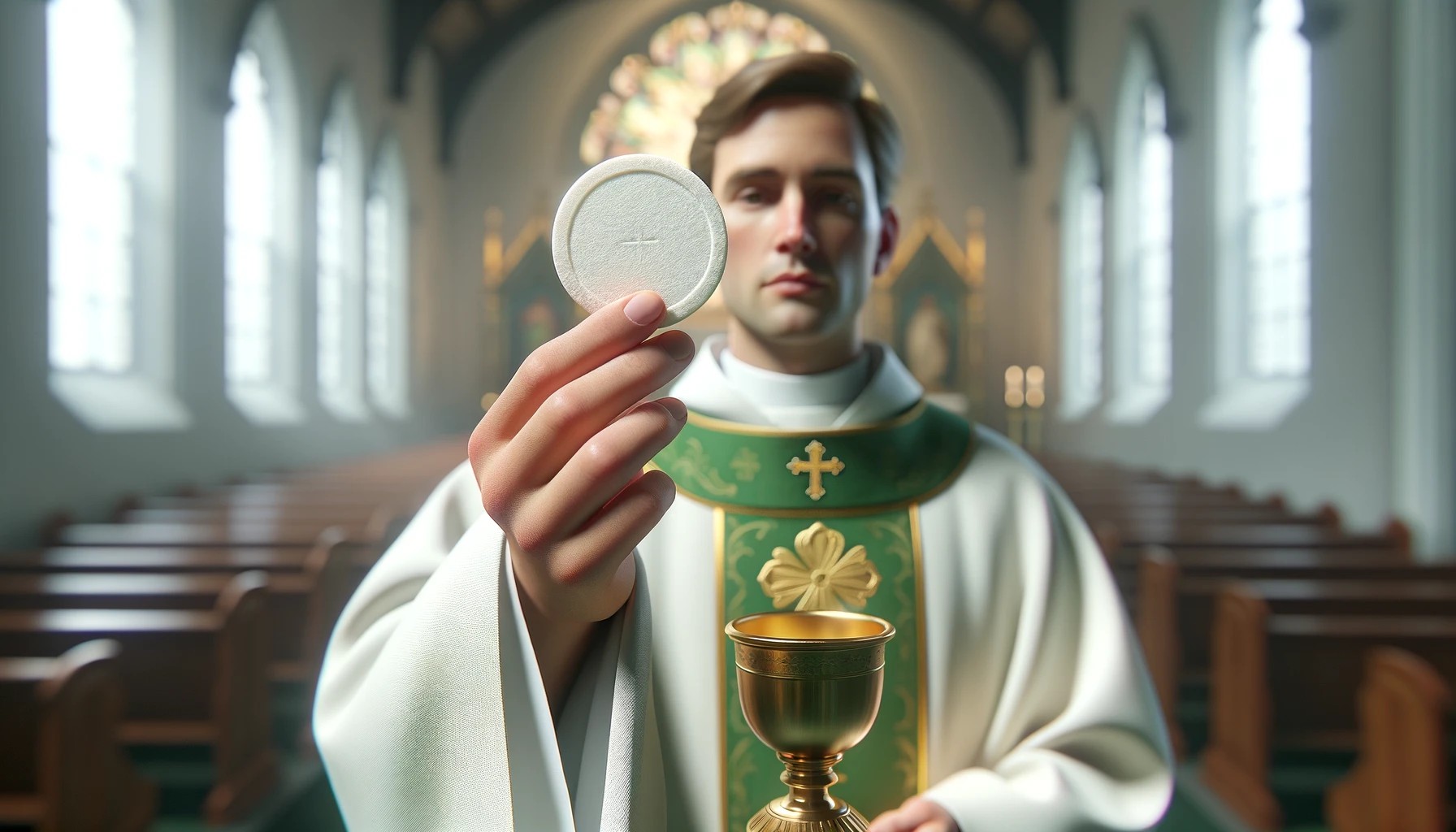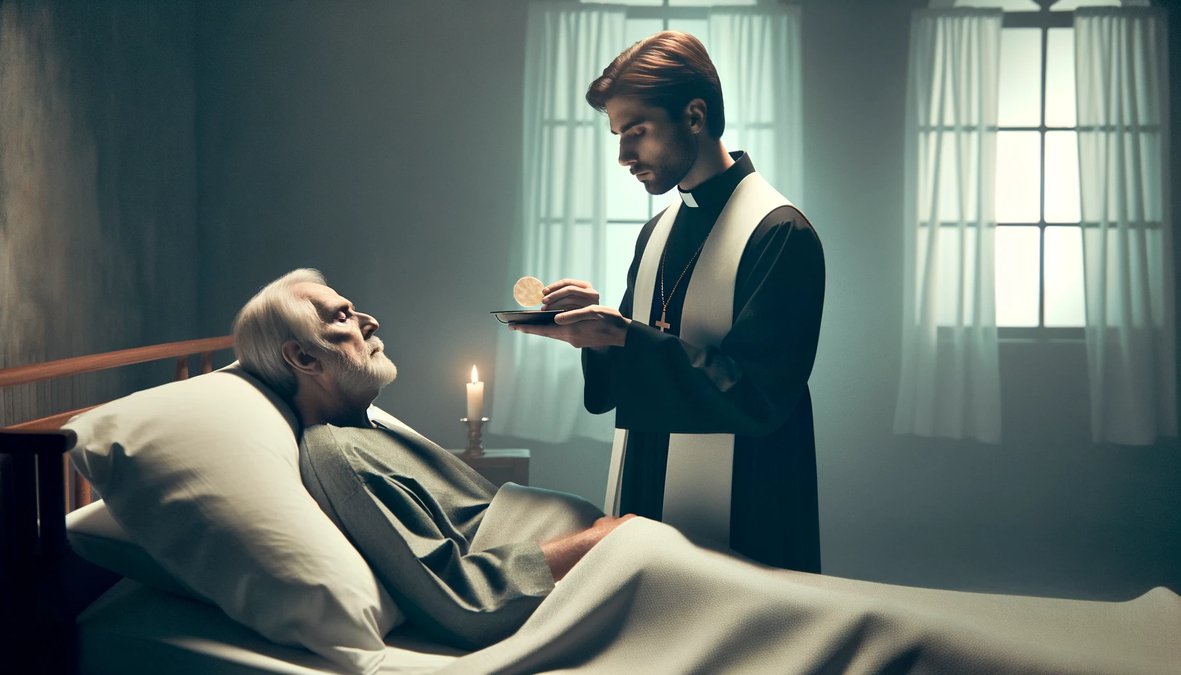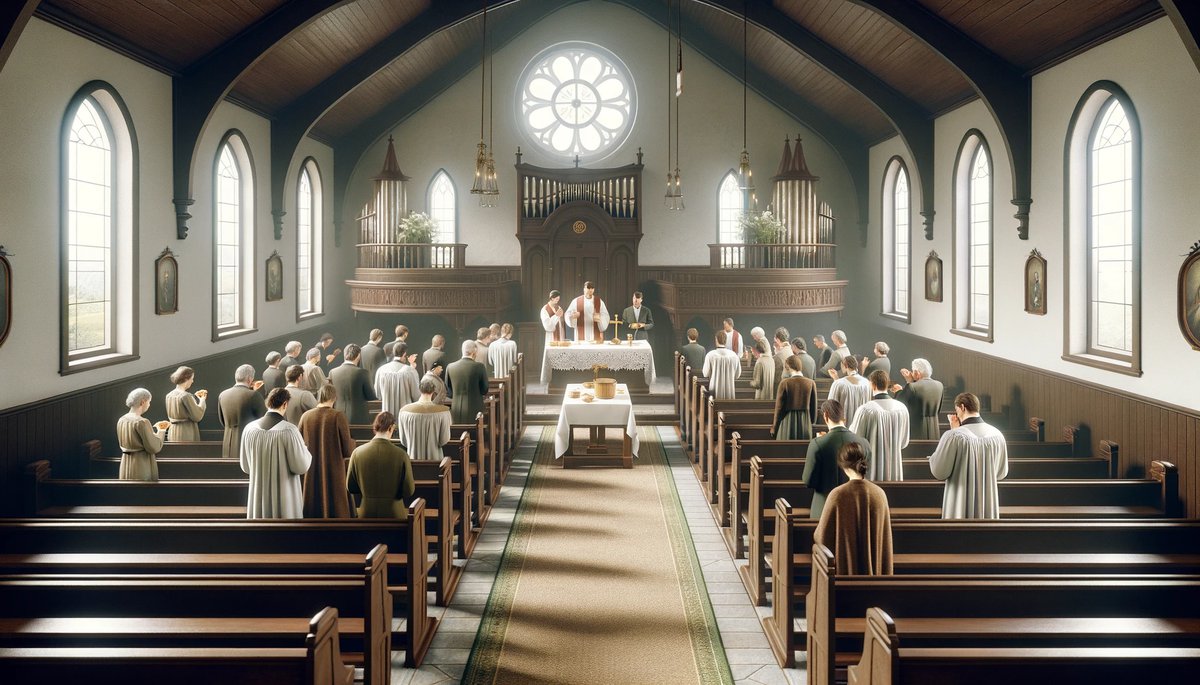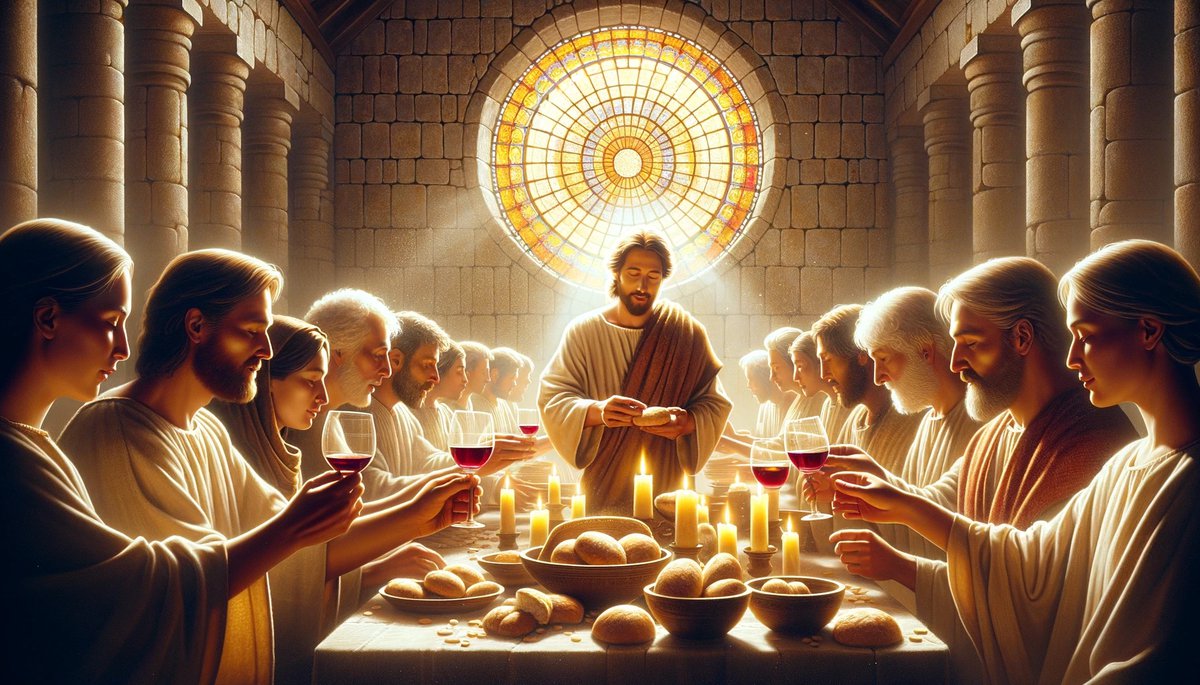Home>Theology and Spirituality>Who Can Give Out Communion In The Catholic Church


Theology and Spirituality
Who Can Give Out Communion In The Catholic Church
Published: February 24, 2024
Peter Smith, Editorial Director at Christian.net, combines deep insights into faith, politics, and culture to lead content creation that resonates widely. Awarded for his contributions to religious discourse, he previously headed a major organization for religious communicators, enhancing dialogue on faith's societal impacts.
Learn about the rules and requirements for administering communion in the Catholic Church. Understand the theology and spirituality behind this sacred practice.
(Many of the links in this article redirect to a specific reviewed product. Your purchase of these products through affiliate links helps to generate commission for Christian.net, at no extra cost. Learn more)
Table of Contents
Introduction
The act of receiving Holy Communion is a sacred and significant ritual in the Catholic Church. It represents the partaking of the body and blood of Christ, symbolizing the spiritual nourishment and unity of believers with Christ and with one another. The distribution of Communion is a solemn responsibility, and understanding who can administer it is essential for maintaining the sanctity of this sacrament.
In the Catholic faith, the administration of Communion is not a casual or arbitrary task. It is governed by specific guidelines and entrusted to individuals who have been ordained or authorized by the Church. The process of distributing Communion involves a deep reverence for the Eucharist and a profound respect for its spiritual significance.
As we delve into the intricate dynamics of Communion distribution within the Catholic Church, we will explore the roles of priests, deacons, extraordinary ministers of Holy Communion, and lay people in this sacred practice. Understanding the distinct responsibilities and permissions of each group sheds light on the reverence and meticulousness with which the Church approaches the administration of Communion.
The distribution of Communion is not merely a procedural task; it is a deeply spiritual act that embodies the core beliefs and traditions of the Catholic faith. By examining the roles and permissions associated with administering Communion, we gain insight into the profound reverence and spiritual significance that underpin this sacred sacrament.
The Role of Priests in Administering Communion
In the Catholic Church, the role of priests in administering Communion is deeply rooted in the theological and sacramental traditions of the faith. As ordained ministers, priests hold a sacred responsibility in facilitating the distribution of the Eucharist during Mass and other liturgical celebrations. This role is intricately tied to the belief in the priesthood as a conduit for the grace and presence of Christ in the Eucharist.
Priests are ordained through the sacrament of Holy Orders, which imparts upon them the authority to preside over the Eucharistic celebration and consecrate the bread and wine, transforming them into the body and blood of Christ. This profound act, known as transubstantiation, is the pinnacle of the Mass and the source of the Eucharist, which is then distributed to the faithful.
During the distribution of Communion, priests approach the altar to receive the consecrated host and wine, which they then offer to the congregation. This act symbolizes the priest's role as a mediator between God and the faithful, as they present the body and blood of Christ to the worshiping community. The priest's gesture of offering the Eucharist underscores the sacred nature of the sacrament and the priest's role as a shepherd guiding the flock in their spiritual journey.
Furthermore, priests are entrusted with ensuring the reverent and dignified distribution of Communion. They are responsible for instructing the faithful on the proper reception of the Eucharist and for upholding the liturgical norms associated with Communion. This includes guiding the congregation in approaching the Eucharist with humility, devotion, and a spirit of unity with Christ and one another.
In summary, the role of priests in administering Communion is multifaceted and deeply significant within the Catholic Church. Their ordained status, their pivotal role in the consecration of the Eucharist, and their responsibility for guiding the faithful in the reception of Communion all underscore the sacred nature of their involvement in this central sacrament of the faith.
Deacons and their Ability to Distribute Communion
Deacons play a vital role in the Catholic Church, and their involvement in the distribution of Communion is a reflection of their ordained ministry. While their responsibilities differ from those of priests, deacons are authorized to assist in the administration of the Eucharist, including the distribution of Communion during Mass and other liturgical services.
The role of deacons in distributing Communion is rooted in their sacramental ordination, which sets them apart for service to the Church and the community. Deacons are ordained clergy, and their ministry encompasses various aspects of pastoral care, service, and liturgical participation. Their ability to distribute Communion is a manifestation of their commitment to serving the faithful and facilitating their participation in the Eucharistic celebration.
During Mass, deacons often assist the priest in preparing the altar and the sacred vessels for the Eucharist. They may also be called upon to proclaim the Gospel, preach, and lead the faithful in prayer. Additionally, deacons have the privilege of distributing the consecrated host to the congregation, thereby contributing to the reverent and orderly reception of Communion.
The involvement of deacons in the distribution of Communion underscores the collaborative nature of the liturgical ministry within the Catholic Church. While priests hold the primary responsibility for presiding over the Eucharistic celebration and consecrating the Eucharist, deacons complement this role by actively participating in the distribution of Communion, ensuring that the faithful receive the body of Christ with reverence and devotion.
Furthermore, the presence of deacons in the Communion distribution process serves as a visible reminder of the diverse ministries within the Church and the shared responsibility of clergy in nurturing the spiritual life of the community. Their active involvement in the distribution of Communion reflects the inclusive and communal nature of the Eucharistic celebration, emphasizing the unity and diversity of ministries within the Church.
In summary, deacons play a significant role in the distribution of Communion, contributing to the reverent and orderly administration of the Eucharist during liturgical services. Their participation underscores the collaborative and inclusive nature of the Church's ministry, enriching the spiritual experience of the faithful as they partake in the sacred sacrament of the Eucharist.
Extraordinary Ministers of Holy Communion
In the Catholic Church, the role of Extraordinary Ministers of Holy Communion (EMHCs) is integral to the reverent and efficient distribution of the Eucharist, particularly in circumstances where the number of communicants or the pastoral needs of the community necessitate additional assistance. EMHCs are appointed by the local bishop or pastor to serve in this capacity, and their involvement reflects the Church's commitment to ensuring that the faithful have access to the sacrament of Communion in a dignified and timely manner.
EMHCs may be selected from among the laity, and their appointment is accompanied by specific training and formation to prepare them for their responsibilities. While the term "extraordinary" may suggest an infrequent or exceptional role, EMHCs serve a crucial function in facilitating the distribution of Communion, especially in larger parishes or during Masses with a high number of attendees.
The involvement of EMHCs in the distribution of Communion is governed by established norms and guidelines set forth by the Church. These norms emphasize the reverence and solemnity with which the Eucharist is to be handled and distributed, ensuring that the faithful receive the body and blood of Christ with the utmost respect and devotion. EMHCs are entrusted with upholding these norms and with approaching their ministry with a deep sense of reverence and humility.
During the distribution of Communion, EMHCs assist the priest or deacon in offering the consecrated host to the congregation. Their role is characterized by a spirit of service and dedication to the pastoral needs of the community. EMHCs approach the distribution of Communion with a profound awareness of the sacredness of the Eucharist, recognizing the significance of their role in facilitating the reception of the body and blood of Christ by the faithful.
The involvement of EMHCs in the distribution of Communion reflects the collaborative nature of ministry within the Church. Their service contributes to the smooth and orderly administration of the Eucharist, ensuring that the faithful have the opportunity to partake in Communion with reverence and devotion. EMHCs embody the spirit of selfless service and dedication, enriching the Eucharistic celebration and fostering a sense of unity and communion within the faith community.
In summary, the role of Extraordinary Ministers of Holy Communion is vital to the reverent and efficient distribution of the Eucharist within the Catholic Church. Their service reflects the Church's commitment to ensuring that the faithful have access to the sacrament of Communion in a dignified and timely manner, underscoring the communal and collaborative nature of ministry within the faith community.
Lay People and their Involvement in Communion Distribution
The involvement of lay people in the distribution of Communion represents a significant aspect of the Catholic Church's sacramental practice. While the administration of the Eucharist is primarily entrusted to ordained clergy, the Church acknowledges the valuable contributions of lay individuals in facilitating the reverent and orderly reception of Communion by the faithful.
Lay people, also known as the laity, play a crucial role in the distribution of Communion, particularly in circumstances where the size of the congregation or the pastoral needs of the community require additional assistance. The participation of lay ministers in this capacity reflects the Church's commitment to ensuring that the faithful have access to the sacrament of Communion in a manner that upholds the sacredness and dignity of the Eucharist.
The involvement of lay people in Communion distribution is governed by specific guidelines and protocols established by the Church. Those selected for this ministry undergo thorough training and formation to prepare them for their responsibilities, ensuring that they approach the distribution of Communion with reverence, humility, and a deep understanding of the sacramental significance of the Eucharist.
During the distribution of Communion, lay ministers assist the clergy in offering the consecrated host to the congregation. Their role is characterized by a spirit of service and a commitment to upholding the liturgical norms associated with the reception of the Eucharist. Lay ministers approach their ministry with a profound awareness of the sacredness of the Eucharist, recognizing the significance of their role in facilitating the reception of the body and blood of Christ by the faithful.
The involvement of lay people in Communion distribution underscores the communal and collaborative nature of ministry within the Church. Their service contributes to the reverent and orderly administration of the Eucharist, ensuring that the faithful have the opportunity to partake in Communion with reverence and devotion. The participation of lay ministers in this capacity enriches the Eucharistic celebration, fostering a sense of unity and communion within the faith community.
In summary, the involvement of lay people in the distribution of Communion is a testament to the inclusive and communal nature of the Church's ministry. Their dedicated service reflects the Church's commitment to ensuring that the faithful have access to the sacrament of Communion in a manner that upholds the sacredness and dignity of the Eucharist, enriching the spiritual experience of the faith community.
Conclusion
In conclusion, the distribution of Communion within the Catholic Church is a deeply sacred and meticulously orchestrated practice that embodies the spiritual nourishment and unity of believers with Christ and one another. The roles and permissions associated with administering Communion reflect the Church's reverence for the Eucharist and its commitment to ensuring that the faithful partake in this sacrament with profound reverence and devotion.
Priests, as ordained ministers, hold a pivotal role in the administration of Communion, stemming from their sacramental ordination and their responsibility for presiding over the Eucharistic celebration. Their role as mediators between God and the faithful underscores the sacred nature of the Eucharist and the priest's guidance in the spiritual journey of the congregation.
Deacons, through their ordained ministry, contribute to the distribution of Communion, reflecting the collaborative and inclusive nature of the Church's liturgical ministry. Their involvement underscores the shared responsibility of clergy in nurturing the spiritual life of the community and enriching the Eucharistic celebration.
The role of Extraordinary Ministers of Holy Communion is integral to ensuring the reverent and efficient distribution of the Eucharist, particularly in circumstances where additional assistance is required. Their service reflects the Church's commitment to upholding the sacredness and dignity of the Eucharist while ensuring that the faithful have access to Communion in a dignified and timely manner.
Lay people, as valued members of the faith community, play a crucial role in the distribution of Communion, contributing to the reverent and orderly reception of the Eucharist. Their involvement underscores the communal and collaborative nature of ministry within the Church, enriching the spiritual experience of the faithful as they partake in the sacred sacrament of the Eucharist.
In essence, the distribution of Communion within the Catholic Church is a harmonious interplay of ordained and lay ministries, all united in their commitment to upholding the sanctity and significance of the Eucharist. This sacred practice serves as a profound expression of the Church's unity, reverence, and devotion to the spiritual nourishment of the faithful, embodying the core beliefs and traditions of the Catholic faith.














